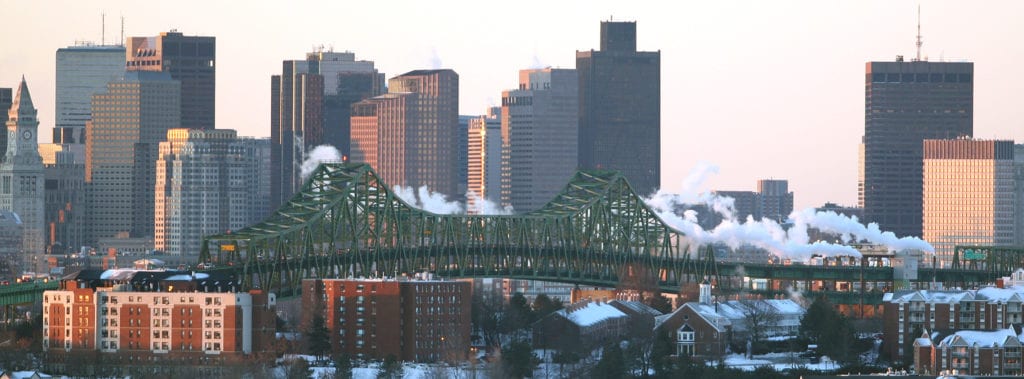
The spread of COVID-19 has escalated across the commonwealth. But last week, U.S. Congressman Joe Kennedy III warned that no community has been as affected as Chelsea.
“The numbers speak for themselves, but they are literally off the charts compared to any other community around our commonwealth,” he said in a video conference streamed on Twitter and Facebook on Thursday, April 9.
Chelsea’s count of cases and deaths continues to rise, with 472 confirmed cases and 14 deaths as of April 11. The largely working-class population of the city of 35,000 was counted as 62 percent Latino and 8.5 percent black in the 2010 Census.
“It comes as no surprise that communities like Chelsea, that have a predominantly immigrant population, are being impacted way more,” said Judith Garcia, Chelsea’s city council vice president.
Chelsea’s rate of infection stood last Thursday at 96 cases per 10,000 residents. Kennedy noted the stark contrast with wealthier communities: Somerville’s latest rate was 12.7 per 10,000, and Brookline’s was 22.5 per 10,000. Garcia said that other communities of color, like Lawrence and Brockton, are also “leading the charts” for confirmed cases.
Poverty may have exacerbated the spread. GreenRoots Executive Director Maria Power noted Chelsea’s vulnerability before the outbreak. “Some folks may be shocked at the numbers,” she said, “This is not a surprise.”
Power said that Chelsea is suffering from environmental injustice, and excess pollution has led to pre-conditions that worsen the virus’ toll. Black and Latino communities are predisposed to illnesses such as hypertension, diabetes and asthma. Some of the highest rates of those diseases are in Massachusetts, said Power.
“This is what poverty looks like,” she said. “This is what being a poor community, an immigrant community, a community of color is, that people are going to die in unprecedented numbers. And we should’ve been ready for this.”
There is also a lack of suitable housing for Chelsea residents. In many units, three or four families may be crowded into a single living space. The close contact increases the spread of infection. When one family is crammed into a single bedroom, said Power, “How do you social distance? How do you socially isolate people? It’s impossible.”
Chelsea City Council President Roy Avellaneda agreed. Even with funding, he said, it’s hard to find shelters.
“If we’re going to have one individual in that family come down with COVID-19, and we need to separate them, they have nowhere to go.”
Avellaneda offered a solution: negotiating with hotels and using their available rooms. Due to stay-at-home orders, many hotels are completely unoccupied.
“Tell us we have the power to commandeer a hotel,” said Avellaneda. “Right now, they’re empty, they’re not doing much business.”
Garcia stressed the importance of immigrant protection. Immigrants make up a large portion of Chelsea, she said, and many are undocumented. Some families refuse to be hospitalized in fear of deportation or biased treatment.
In addition, detained immigrants throughout the country face risks from close confines. Detainment facilities are often congested and unsanitary, providing an ideal environment for the virus to spread.
A recent local coronavirus class action against ICE just ended with a favorable ruling. The court acknowledged “unconstitutional overcrowding that binds the class together.” The class consisted of civil immigration detainees held at a Bristol County and North Dartmouth facility. Eighteen immigrants from Bristol County have already been released due to the outcome of the case.
Chelsea also has a high population of service workers. Kennedy noted that Chelsea buses are still packed with people. Many risk their lives on public transportation to get to work. Some residents are going to work because they’ve been deemed “essential” workers, said Kennedy, while some just fear they won’t otherwise make their upcoming rent payments.
Avellaneda noted that many residents did not expect incoming aid and said that the federal government warned people and organized aid far too late.
“If you told our community a month ago that we were going to have these resources, people wouldn’t have been packing themselves into a 111 or 116 bus,” he said. “We wouldn’t have gone into work and faced our jobs.”
The fate of the community was sealed a month ago, said Avellaneda.
“I hate to say it, but it’s already too late,” he said.
Avellaneda added that the community needs money. It needs direct assistance from the federal government to pay for food and shelter.
President Trump’s recent economic stimulus package allocated $1,200 to certain individuals, but Kennedy said that this isn’t enough. He said that this amount won’t go far in Chelsea, and that $4,000 per person would be a better alternative.
Residents must pay mounting health bills, said Kennedy. Although COVID-19 testing is free, treatment is not. Many families cannot afford expensive ventilators and ICU stays.
Garcia also acknowledged the necessity of increased funding. But she stressed that the community needs “intentional leadership.”
“We need leaders who are going to push for priority funding, testing and facilities for communities, based on the rates of infection,” she said.
Chelsea has been left alone to deal with the pandemic, she added.
“We know that the commonwealth is doing whatever they can to focus a response throughout the state, but we have not been seeing and getting the help that we would like to receive.”
Avellaneda agreed.
“Too many times, our voices are not heard.”






